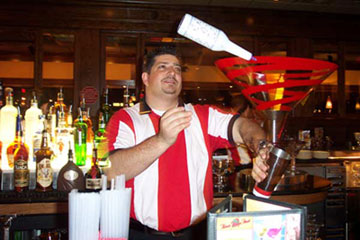


Toward the end of the movie, there's a scene where he allegedly chooses love over money, but then, a few months later, he is the owner and operator of his own slick Manhattan singles bar. That's why Shue doesn't tell him at first that she's rich.

Cruise is painted throughout the film as a cynical, success-oriented 1980s materialist who wants only to meet a rich woman and own his own bar. One of the weirdest things about "Cocktail"' is the so-called message it thinks it contains. If the film had been told from his point of view, it would have been a lot more interesting, but box-office considerations no doubt required the center of gravity to shift to Cruise and Shue. The movie's most interesting character is the older bartender, superbly played by Brown, who never has a false moment. It's a shame the filmmakers didn't take a longer, harder look at this material. Shue, who does whatever is possible with her role, is handicaped because her character is denied the freedom to make natural choices at every moment, her actions are dictated by the artificial demands of the plot. There is not a moment in the movie's last half-hour that is not borrowed from other movies, and eventually even the talented and graceful Cruise can be seen laboring with the ungainly reversals in the script.
#Tom cruise bartender movie#
The last stages of the movie were written, directed and acted on automatic pilot, as Shue's millionaire daddy tries to throw Cruise out of the penthouse but love triumphs. They find true love, which is shattered when Shue sees Cruise with the rich Manhattan executive.Īfter the executive takes Cruise back to New York and tries to turn him into a pampered stud, he realizes his mistake and apologizes to Shue, only to discover, of course, that she is pregnant - and rich. It makes a crucial error when it introduces a love story, involving Cruise and Elisabeth Shue, as a vacationing waitress from New York. If the film had stuck to the relationship between Cruise and Brown, it might have had a chance. But given the premise that he and Brown drink all of the time, shouldn't they be drunk, or hung over, at least most of the time? Not in this fantasy world. Sure, Cruise gets tanked a couple of times and staggers around a little and throws a few punches. And that's another area this movie knows little about: the actual effects of drinking. What do you think? Do you believe a millionaire Manhattan woman executive in her 30s would sleep with a wildly promiscuous bartender she picks up on the beach? Not unless she was seriously drunk. That's made possible by the fact that no one in this movie has ever heard of AIDS, not even the rich female fashion executive ( Lisa Banes) who picks Cruise up and takes him back to Manhattan with her.

There, as elsewhere, his twinkling eyes and friendly smile seem irresistible to the women on the other side of the bar, and he lives in a world of one-night stands. In the real world, Cruise and Brown would be fired for their time-wasting grandstanding behind the bar, but in this movie they get hired to work in a fancy disco where they have a fight over a girl and Cruise heads for Jamaica. That's when Cruise drops out of school, becomes a full-time bartender, makes Brown his best friend and learns to juggle those bottles. The first part of the movie works the best. The movie is supposed to be about how he outgrows his materialism, although the closing scenes leave room for enormous doubts about his redemption. He studies self-help books and believes that he'll be rich someday, if only he gets that big break. Brown advises Cruise to keep his eyes open for a "rich chick," because that's his ticket to someday opening his own bar. This isn't bartending, it's a music video, and real drinkers wouldn't applaud, they'd shout: "Shut up and pour!" The bartenders in the film are played by Tom Cruise, as a young ex-serviceman who dreams of becoming a millionaire, and Bryan Brown, as a hard-bitten veteran who has lots of cynical advice. They get a roaring ovation from the customers in their crowded bar, which is a tip-off to the movie's glossy phoniness. All of this is done to rock 'n' roll music, and it takes them about four minutes to make two drinks. They juggle bottles in unison, one spins ice cubes into the air and the other one catches them, and then they flip bottles at each other like a couple of circus jugglers. What is remarkable, given the subject, is how little the movie knows about bars or drinking.Įarly in the film, there's a scene where the two bartenders stage an elaborately choreographed act behind the bar. "Cocktail" tells the story of two bartenders and their adventures in six bars and several bedrooms.


 0 kommentar(er)
0 kommentar(er)
